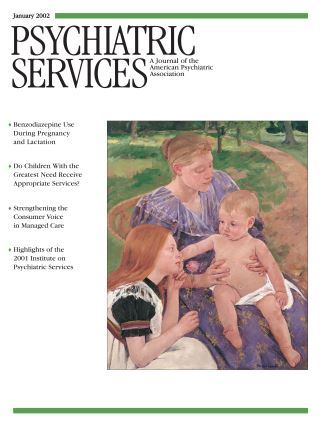Psychotherapy conducted in a conversational mode relies on auditory language processing, which involves concentration, attention, and working memory. All of these faculties may be compromised in people who have schizophrenia. Some case studies that two colleagues and I published in this journal in October 1997 showed that visual representation of spoken words, displayed by typing the conversation between patient and therapist on a computer screen, may compensate for some of these deficits and enhance communication.
At Taunton (Mass.) State Hospital we conducted a pilot study of the efficacy of this approach with ten patients diagnosed as having schizophrenia or schizoaffective disorder. The study was approved by the research review committee of the Massachusetts Department of Mental Health, and all participants provided written informed consent. We divided the patients into an experimental group and a control group, each comprising four men and one woman.
The mean±SD age of those in the experimental group was 37.8±6.3 years, and they had a mean of 10.6±1.1 years of education; their first psychiatric hospitalization occurred at a mean age of 28.8±7 years. In the control group the mean age was 44.2±14.3 years, the mean educational attainment was 10.4±1.8 years, and the mean age at first psychiatric hospitalization was 25.8±14.7 years.
All participants received eight 20- to 30-minute sessions over two to four months. Therapists followed a guideline to select common themes and issues that were to be discussed in the sessions. Topics included the treatment plan and goals, the patient's current functioning, medication issues, identification of treatment team members and their roles, and reasons for hospitalization. In the experimental group, the patient and the therapist sat in front of a computer, with the therapist at the keyboard. The therapist typed a brief version of each question, followed by the patient's responses verbatim. A transcript was given to the patient after each session. For the control group, identical issues were discussed with the usual conversational modality.
All patients answered a 29-item questionnaire administered by the unit nurse before and after the eight treatment sessions. The answers fell into two broad categories: a "negative response" category that included "No, I don't know" or any type of vague or irrelevant response, and a "productive association" category that included any meaningful or relevant response.
The control and experimental groups did not show any significant difference at the pretreatment assessment. For the control group, a mean±SD of 8.3±5.6 answers were categorized as negative responses and 25.8±9.6 as productive associations; for the experimental group the figures were 8.8±7.4 and 27.9±12.5, respectively.
At the posttreatment assessment, the experimental group showed a significantly lower rate of negative responses (5.3±3.75 compared with 11±3.66; t=−2.61, df=4, p=.01; one-tailed test) and a significantly higher rate of productive associations (34.1±7.8 compared with 26±7.7; t=−2.76, df=4, p=.02; one-tailed test).
In a comparison of within-group pretreatment and posttreatment differences, the predicted improvement for productive associations was significant for the experimental group (t=2.25, df=4, p=.04; one-tailed test). The predicted decrease in the negative response category was not large enough to be statistically significant. For the control group, there was no significant change in either of the two variables.
The results of this pilot study suggest that therapeutic communication accompanied by visual representation of spoken words may be more effective in increasing associations and productive thoughts related to the issues the therapist and the patient discuss. The technique may help compensate for deficits in verbal memory, working memory, and attentional process, which can interfere with communication. Such compensation may help patients with schizophrenia better understand and remember the issues discussed in therapeutic encounters. Controlled studies using a longer time frame and a larger sample could help to validate this hypothesis and assess whether the effect persists.

